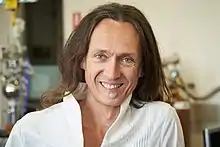Andrea Morello
Andrea Morello (born 26 June 1972, in Pinerolo, Italy) is the Scientia Professor of quantum engineering in the School of Electrical Engineering and Telecommunications at the University of New South Wales, and a Program Manager at the ARC Centre of Excellence for Quantum Computation and Communication Technology (CQC2T). Morello is the head of the Fundamental Quantum Technologies Laboratory at UNSW.[2][3][4]
Andrea Morello | |
|---|---|
 Morello in 2019 | |
| Born | Andrea Morello June 26, 1972 Pinerolo, Italy |
| Alma mater | Leiden University (PhD) |
| Awards |
|
| Scientific career | |
| Fields | |
| Institutions | |
| Thesis | Quantum spin dynamics in single-molecule magnets (2004) |
| Doctoral advisor | Professor Jos de Jongh |
| Website | www |
Education
Morello completed his undergraduate degree in electrical engineering at the Politecnico di Torino in Italy in 1998.[5][6] His research career began at the Grenoble High Magnetic Field Laboratory where he investigated the magnetic phase diagram of high superconductors. He obtained his PhD in experimental physics from the Kamerlingh Onnes Laboratory in Leiden in 2004,[7] during which he explored the quantum dynamics of molecular nanomagnets at low temperatures. Morello spent two years at the University of British Columbia before joining UNSW Sydney in 2006.[8][9]
Research
Morello's research is primarily focused on designing and building the basic components of a quantum computer using the spins of single atoms in silicon.[10][11][12] His team were the first in the world to demonstrate the coherent control and readout of the electron and nuclear spin of an individual phosphorus atom in silicon,[13][14][15][16] and for many years they held the record for the longest quantum memory time for a single qubit in the solid state (35.6 seconds).[17] Morello's research also focuses on using highly coherent spin systems to study the foundations of quantum mechanics.[18][19][20][21]
Outreach
Outside of his research Morello is actively engaged in science outreach and education.[22][23] He has produced a series of YouTube videos 'The Quantum Around You' and 'Quantum Computing Concepts' to bring the fundamental concepts of quantum physics to a wider audience.[24][25][18] Morello also starred in a series of videos produced by YouTuber Derek Muller on his channel Veritasium, explaining the fundamental concepts of quantum computing, with the highest viewed video in this series being watched over 4.4 million times.[26]
Honours
- 2011. Eureka Prize for Scientific Research[27][28]
- 2013. Malcolm Macintosh Prize for Physical Scientist of the Year (Prime Minister's Prizes)[29] and the David Syme Research Prize[30]
- 2014. NSW Science and Engineering Award for Emerging Research[31]
- 2017. Fellow of the American Physical Society (FAPS) and the inaugural recipient of the Rolf Landauer and Charles H Bennett Award in Quantum Computing[20][19]
- 2017. Fellow of the Royal Society of NSW[32] and winner of the Pollock Memorial Lectureship[33]
- 2019. Walter Boas Medal[34]
References
- "2017 Rolf Landauer and Charles H. Bennett Award in Quantum Computing Recipient". aps.org. Retrieved 2020-11-30.
- "Scientia Professor Andrea Morello". research.unsw.edu.au. Retrieved 2019-12-09.
- "The quantum spinmeister". Cosmos Magazine. Retrieved 2019-12-09.
- Hannam, Peter (2017-09-06). "'Nobody saw it': Breakthrough claimed by UNSW's quantum computing team". The Sydney Morning Herald. Retrieved 2019-12-09.
- "2018 Stanley Corrsin Award Recipient". www.aps.org. Retrieved 2019-11-16.
- "Andrea Morello". The Conversation. 24 March 2011. Retrieved 2019-12-09.
- "Andrea Morello 2017". World Science Festival Brisbane. Retrieved 2019-12-09.
- "morello, Author at CQC2T". CQC2T. Retrieved 2019-11-16.
- "The quantum gamble". Science Meets Business. 2017-07-27. Retrieved 2019-12-09.
- "Breakthrough for quantum computers". Cosmos Magazine. Retrieved 2019-12-09.
- Reynolds, Matt. "This qubit redesign may make it easier to make quantum computers". New Scientist. Retrieved 2019-12-09.
- "Why use silicon qubits for quantum computing?". Physics World. 2016-08-31. Retrieved 2019-12-09.
- Pla, Jarryd J.; Tan, Kuan Y.; Dehollain, Juan P.; Lim, Wee H.; Morton, John J. L.; Zwanenburg, Floris A.; Jamieson, David N.; Dzurak, Andrew S.; Morello, Andrea (2013). "High-fidelity readout and control of a nuclear spin qubit in silicon". Nature. 496 (7445): 334–338. arXiv:1302.0047. Bibcode:2013Natur.496..334P. doi:10.1038/nature12011. ISSN 1476-4687. PMID 23598342. S2CID 4416336.
- "Electrical control of quantum bits in silicon paves the way to large quantum computers". phys.org. Retrieved 2019-12-09.
- "In the race to build the world's first quantum computer, UNSW bets on silicon". Create. 2017-10-19. Retrieved 2019-12-09.
- "Quantum computing taps nucleus of single atom". EurekAlert!. Retrieved 2019-12-09.
- Robertson, James (2013-04-18). "Quantum leap in quest for super computer". The Sydney Morning Herald. Retrieved 2019-12-09.
- "Conference | Sibos". www.sibos.com. Retrieved 2019-11-17.
- "2017 Rolf Landauer and Charles H. Bennett Award in Quantum Computing Recipient". www.aps.org. Retrieved 2019-12-09.
- "Andrea Morello awarded inaugural quantum computing award | Engineers Australia". www.engineersaustralia.org.au. Retrieved 2019-12-09.
- Mourik, Vincent; Asaad, Serwan; Firgau, Hannes; Pla, Jarryd J.; Holmes, Catherine; Milburn, Gerard J.; McCallum, Jeffrey C.; Morello, Andrea (2018-10-05). "Exploring quantum chaos with a single nuclear spin". Physical Review E. 98 (4): 042206. arXiv:1703.04852. Bibcode:2018PhRvE..98d2206M. doi:10.1103/PhysRevE.98.042206. S2CID 118941667.
- Djekic, Milica (2014-09-26). "A Brief Talk with Andrea Morello, a Leading Australian Quantum Physicist". Australian Science. Retrieved 2019-12-09.
- "On The Red Dot 2017". Toggle. Archived from the original on March 9, 2018. Retrieved 2019-12-11.
- "The Quantum Around You - With Andrea Morello". Australia's Science Channel. Retrieved 2019-11-16.
- "Quantum Computing Concepts". Australia's Science Channel. Retrieved 2019-11-16.
- How Does a Quantum Computer Work?, retrieved 2019-11-16
- "Eureka Prize Winners for 2011". www.theaustralian.com.au. 2011-09-06. Retrieved 2019-12-09.
- "People". quantumtimeline.com.au. Retrieved 2019-12-09.
- "2013 PM's Prize for Science: Andrea Morello". The Sydney Morning Herald. 30 October 2013. Retrieved 2019-12-09.
- "David Syme Research Prize", Wikipedia, 2019-12-05, retrieved 2019-12-09
- NSW, Inspiring (2014-10-23). "2014 NSW Science and Engineering Awards". Inspiring Australia. Retrieved 2019-12-09.
- "Fellows - The Royal Society of NSW". royalsoc.org.au. Archived from the original on 2019-09-27. Retrieved 2019-12-09.
- "Pollock Lecture - The Royal Society of NSW". royalsoc.org.au. Retrieved 2019-12-09.
- "The Australian Institute of Physics - AIP awards announcement". www.aip.org.au. Retrieved 2021-09-13.